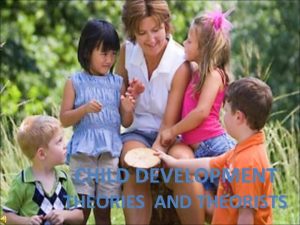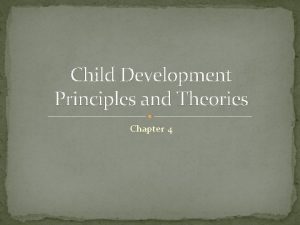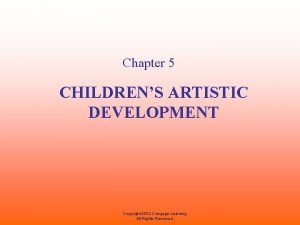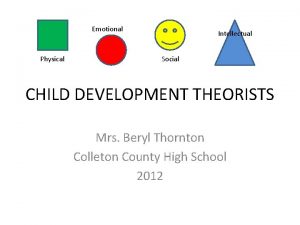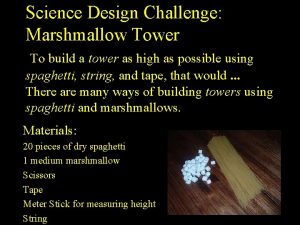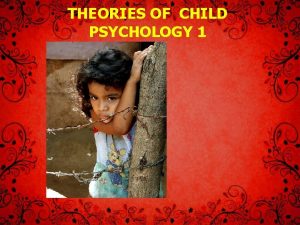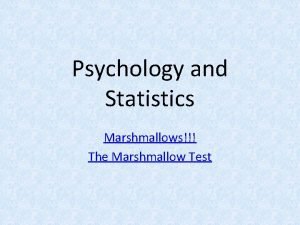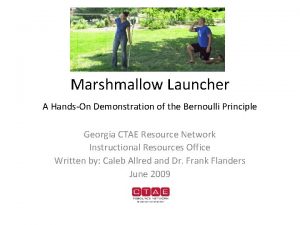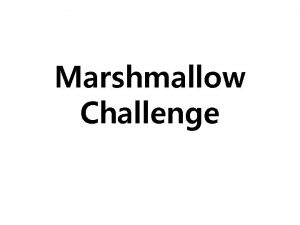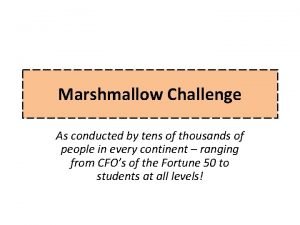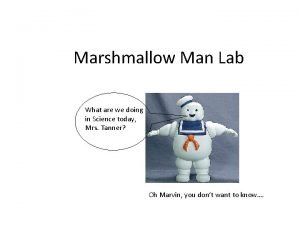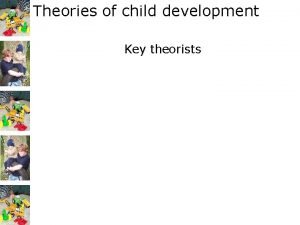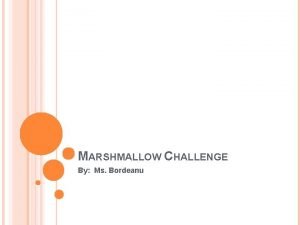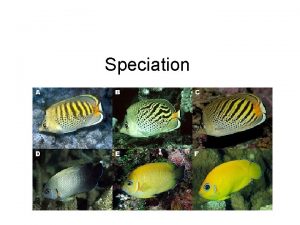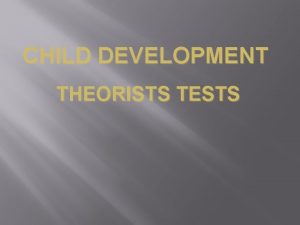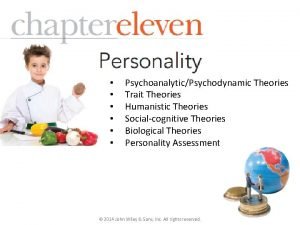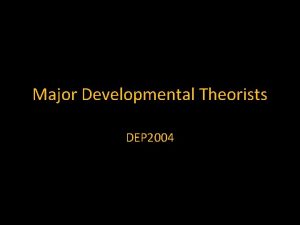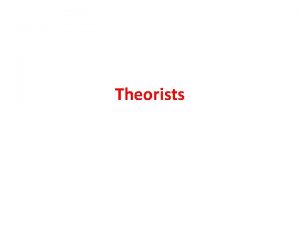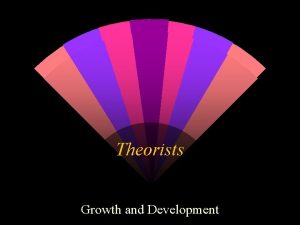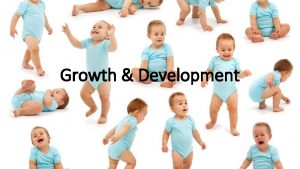CHILD DEVELOPMENT THEORIES AND THEORISTS Experiment 1 Marshmallow
















- Slides: 16

CHILD DEVELOPMENT THEORIES AND THEORISTS

Experiment 1 - Marshmallow Kids Marshmallow Experiment The marshmallow experiment is a famous test of this concept conducted by Walter Mischel at Stanford University and discussed by Daniel Goleman in his popular work. In the 1960 s, a group of four-year olds were given a marshmallow and promised another, only if they could wait 20 minutes before eating the first one. Some children could wait and others could not. The researchers then followed the progress of each child into adolescence, and demonstrated that those with the ability to wait were better adjusted and more dependable (determined via surveys of their parents and teachers), and scored an average of 210 points higher on the Scholastic Aptitude Test. http: //www. youtube. com/watch? v=6 Ej. Js. Pyl. EOY

What is a Theory? To guide their questions, research, and interpretations of data, developmental scholars construct ‘theories’. A theory is an organized system of principles and explanations for a particular phenomena.

7 categories of child development theory 1. Biological Theories 2. Behaviorism and Social Learning Theories 3. Psychodynamic Theories 4. Cognitive-Developmental Theories 5. Cognitive Process Theories 6. Sociocultural Theories 7. Developmental Systems Theories

1. Biological Theories These theories focus on genetic factors(DNA), physiological structures and functions of the body, and the psychological processes that help the child adapt and survive in their environment. Emphasis on NATURE. Theorists include: Charles Darwin, Arnold Gesell, Maria Montessori, Konrad Lorenz, John Bowlby, Henry Wellman, Susan Gelman, David Bjorklund, Robert Plomin, Sandra Scarr, and Mary Ainsworth.

Video Maria Montessori “ Her life and Legacy” Montessori Education for the early childhood Years http: //www. youtube. com/watch? v=OM 1 Gu 9 KXVkk

2. Behaviourism and Social Learning Theories Theorists focus on environmental stimuli and learning processes that lead to behavioral change. When children act, the environment responds with rewards or punishment. Emphasis on NURTURE. Theorists include B. F. Skinner, John B. Watson, Ivan Pavlov, Sidney Bijou, Donald Baer, and Albert Bandura.

Video Skinner – Pigeon operant conditioning positive reinforcement http: //www. youtube. com/watch? v=mm 5 FGr. QEy. BY Pavlov – Classical conditioning http: //www. youtube. com/watch? v=hhqumfpxuz. I

3 PSYCHODYNAMIC THEORIES Theorists focus on how family and society affect how children control and express instinctual urges such as sexuality and aggressiveness. Social relationships affect children’s basic trust in others and perception/identity of themselves as individuals. Theorists include Sigmund Freud, Anna Freud, and Erikson.

Video Erikson – stages of psycho-social development http: //www. youtube. com/watch? v=bd. PPXGad. RAU Freud – The talking treatment, the basis of all psychotherapy http: //www. youtube. com/watch? v=AUB 85 l. Sj 4 p. M&feature=related

4 Cognitive Theory Development Theorists believe that children’s thinking undergoes transformations toward increasingly abstract and systematic patterns. It may depend on early experiences. Children can eventually see a single event from several valid points of view. Theorists include Jean Piaget, Bärbel Inhelder, Lawrence Kohlberg, David Elkind, Robbie Case, and John Flavell.

Video Piaget’s stages of development http: //www. youtube. com/watch? v=TRF 27 F 2 bn-A&feature=related Elkind/Piaget http: //www. youtube. com/watch? v=l. Eam 9 lpa 6 TQ

5. Cognitive Process Theorists include David Klahr, Deanna Kuhn, Robert Siegler, Ann L. Brown, Henry Wellman, Susan Gelman, John Flavell, and Robbie Case. Theorists focus on both nature and nurture. Children are born with the basic capacity to perceive, interpret, and remember information. Those capacities change with brain maturation, experience, and reflection. This theory differs from Cognitive Development Theory in that it focuses on interpretation of information.

6. Socio-cultural Theory With an emphasis on nurture, theorists believe all children will naturally learn to use communication, intellectual abilities, and socialemotional skills… but families and community/culture influence how they carry out these tasks. Theorists include Lev Vygotsky, A. R. Luria, James Wertsch, Barbara Rogoff, Patricia Greenfield, Mary Gauvain, Jerome Bruner, and Michael Cole.

7. Developmental Systems Theories Theorists include Urie Bronfenbrenner, Arnold Sameroff, Richard Lerner, Kurt Fischer, Esther Thelen, Gilbert Gottlieb, and Paul Baltes. Factors inside the child (nature) and outside the child (nurture) combine to influence developmental patterns. Their own activities, from sleeping and eating patterns to watching TV and playing sports, also influence development throughout the life cycle.

AN ECLECTIC APPROACH… No single theory can explain all aspects of child development. An eclectic approach, one that includes many perspectives including some nature and some nurture… is probably the most useful.
 The hidden tiger illusion
The hidden tiger illusion Educational theorists and their theories
Educational theorists and their theories Chapter 4 child development principles and theories
Chapter 4 child development principles and theories Kellogg's stages of drawing
Kellogg's stages of drawing Physical development theorists arnold gesell
Physical development theorists arnold gesell Toothpick eiffel tower
Toothpick eiffel tower Marshmallow challenge materials
Marshmallow challenge materials Developmental stage theory
Developmental stage theory Marshmallow challenge statistics
Marshmallow challenge statistics Ode to a marshmallow
Ode to a marshmallow Marshmallow launcher
Marshmallow launcher Marshmallow
Marshmallow Best spaghetti marshmallow structure
Best spaghetti marshmallow structure Hanson wok
Hanson wok In marshmallow muscles what is the independent variable
In marshmallow muscles what is the independent variable Marshmallow man lab
Marshmallow man lab Don't eat the marshmallow yet
Don't eat the marshmallow yet
